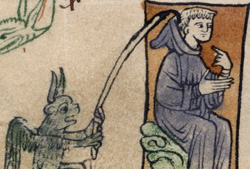 |
 |
 |
 |
 |
 |
 |
|
The Cistercians through medieval eyes: the Benedictines on the Cistercians (3/7) As a White monk on common fare
I’d mess but they provide two well-cooked relishes. They hate, what
I have ever sorely hated a peasant’s holding near their own located.
They lust for land, these plaguey folk, and groan if neighbours’ fields set limits to their own. Enough of milk and wool their beasts
provide. But with enough they’re never satisfied. Always encroaching
though their needs be scant had they the world they’d still be in
want. They’ll feed me well while I’m a novice yet, but keep me busy,
for to all are set their special tasks, lest any seem to be slothful,
or lacking share in industry. A Sabbath-rest is rare, for with less
work there’s less to eat - good reason not to shirk. The rod’s in
frequent use, the diet’s rough; unappetising fare’s though good
enough. Never flesh-meat save one in high position, abbot or prior,
kindly gives permission. Strong meat of four-foot beasts the Rule
denies; so flesh of bird that runs or bird that flies they long
for, not as tasty but as rare. But when they cook it, no-one dwelling
near perceives the smoke, too conscious of the act. The meal all
done, no vestige of the fact remains, for lest the chicken-bones
be found crying, "We’re here" they‘re buried underground.
To all are given three tunics by right, two cowls and a short scapular
- by night no drawers impede them as they lie in bed, no fear lest
I be thus inhibited. They bar their gates and keep
their private quarters completely enclosed. They will not admit
a monk from another religious house to their cells, nor allow one
to come with them into the church for Mass or any of the offices.
|
|||

